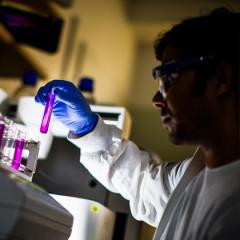A first of its kind brain organoid grown at The University of Queensland has helped researchers identify therapies that reduce the impact of COVID-19 on people with Down syndrome.

Australian Institute for Bioengineering and Nanotechnology (AIBN) Senior Research Fellow Dr Mohammed Shaker and organoid expert Professor Ernst Wolvetang worked with a team to develop a synthetic organoid that mirrors the brain of a person with Down syndrome, to explore why people born with the genetic condition are more vulnerable to the coronavirus.
“The risk of hospitalisation and death from coronavirus is much higher for people with Down syndrome, but until now there has been no clear data that explains why,” Dr Shaker said.

“Thankfully, our lab-grown organoids allow us to unlock this information and find ways to address the problem.”
Organoids are tiny, synthetic organ replicas grown from human stem cells that researchers use to carry out experiments that would be ethically and practically difficult in live subjects.
The team grew Down syndrome brain models and encased them in a layer of specialised cells known as the choroid plexus, effectively creating an organoid with two functional brain domains for the first time.
Testing on the new organoid models revealed that certain components of the choroid plexus are underdeveloped in people born with Down syndrome.
“The barrier function of the choroid plexus prevents coronavirus from infecting brain cells, and this barrier is compromised in people with Down syndrome,” Professor Wolvetang said.
“It means a crucial line of defence is missing and explains why patients in this cohort experience more severe COVID-19 symptoms.”
Join The Network
Stay on top of our industry news and developments, events and opportunities, by joining The Network
The lab used the organoids to screen drug therapies that could compensate for this vulnerability, including the US Food and Drug Administration approved drugs Avoralstat, Camostat, Nafamostat, and Remdesivir.
Dr Shaker said it was clear that human brain organoid models could be important medical tools that offer unprecedented insights and potential drug screening for a range of conditions beyond Down syndrome and COVID-19.
"This work exemplifies how increasingly sophisticated human brain organoid models can be used to discover the cellular and molecular processes driving neurological diseases,” he said.
“It also shows that these organoids are crucial tools that allow us to evaluate the safety and efficacy of new therapeutics at scale."
The research was published in the journal Science Advances.
Professor Wolvetang and Dr Shaker were assisted by AIBN colleagues Bahaa Al-mhanawi and Sean Morrison as well as Professor Alexander Khromykh, Dr Andrii Slonchak, and Julian Sng from the UQ School of Chemistry and Molecular Biosciences, and Professor Justin Cooper-White from the UQ School of Chemical Engineering.
Media: AIBN Communications a.druce@uq.edu.au and +61 447 305 979; UQ Communications communications@aibn.uq.edu.au.


